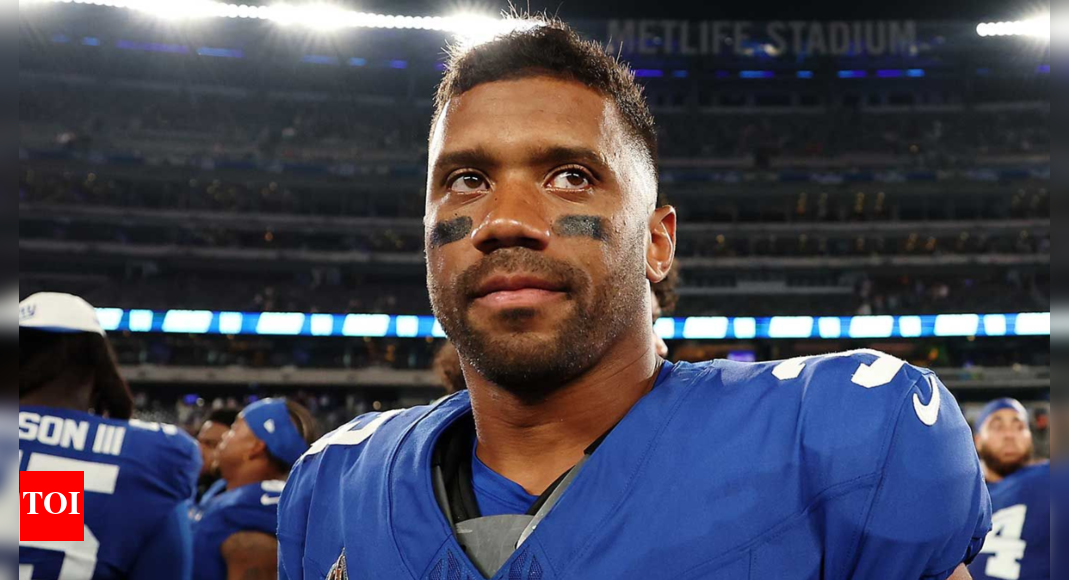The NFL landscape is buzzing with speculation as Russell Wilson finds himself at the center of trade discussions once again. After being benched by his current team following a disappointing losing streak, the veteran quarterback’s future remains uncertain, with industry insiders suggesting multiple franchises could be eyeing a potential acquisition.
The Current Situation: From Starter to Trade Candidate
Wilson’s recent benching in favor of rookie quarterback Jaxson Dart has sent shockwaves through the NFL community. This dramatic shift from established veteran to bench player represents a significant fall from grace for a quarterback who has previously led teams to playoff success and Super Bowl appearances.
The decision to bench Wilson wasn’t made lightly. After a series of losses that highlighted ongoing struggles with offensive coordination and individual performance metrics, team management felt compelled to explore alternative options at the quarterback position. This move signals not just immediate tactical changes, but potentially a fundamental shift in the franchise’s long-term quarterback strategy.
Performance Analysis and Contributing Factors
Several factors have contributed to Wilson’s current predicament. His recent statistical performance has shown concerning trends, including decreased mobility in the pocket, reduced deep ball accuracy, and struggles with pre-snap reads. These issues, combined with the team’s overall offensive struggles, created a perfect storm leading to his benching.
Additionally, Wilson’s substantial contract has become a double-edged sword. While his experience and proven track record justify significant investment, the financial commitment makes it challenging for teams to absorb his salary cap hit, especially if performance doesn’t match expectations.
Market Dynamics and Potential Suitors
NFL insider Mike Florio has suggested that the Cincinnati Bengals might emerge as a potential landing spot for Wilson, possibly in exchange for a fifth-round draft pick. This speculation highlights several interesting market dynamics currently at play in the NFL.
The Cincinnati Connection
The Bengals’ potential interest in Wilson makes strategic sense from multiple angles. Despite having talented players, Cincinnati has experienced inconsistency at the quarterback position, and Wilson’s veteran leadership could provide stability and playoff experience. His ability to extend plays and create opportunities outside of structured offensive schemes could complement the Bengals’ existing offensive weapons.
From a financial perspective, acquiring Wilson for a fifth-round pick would represent minimal risk for Cincinnati. If Wilson can return to form, the Bengals would gain a proven quarterback at a fraction of his market value. If the experiment fails, they’ve invested relatively little in the attempt.
Other Potential Destinations
Beyond Cincinnati, several other franchises could theoretically benefit from Wilson’s services. Teams with aging quarterbacks, inconsistent play at the position, or playoff aspirations might view Wilson as a short-term solution or valuable backup option.
Playoff-contending teams seeking quarterback depth might find Wilson particularly attractive. His postseason experience and ability to perform in high-pressure situations could prove invaluable during crucial games. Additionally, teams with young quarterbacks might benefit from Wilson’s mentorship and veteran presence in the locker room.
Financial Implications and Contract Considerations
Any potential trade involving Wilson must navigate complex financial considerations. His current contract structure, including guaranteed money, signing bonuses, and salary cap implications, will significantly influence trade negotiations.
Salary Cap Impact
Wilson’s substantial contract creates challenges for both his current team and potential trade partners. The acquiring team would need sufficient salary cap space to accommodate his contract, while his current team might need to absorb dead money or restructure the deal to facilitate a trade.
This financial complexity explains why Wilson might be available for relatively modest compensation like a fifth-round pick. Teams aren’t just trading for his on-field contributions; they’re also assuming significant financial obligations.
Historical Context and Precedent
Wilson’s situation isn’t unprecedented in NFL history. Several veteran quarterbacks have successfully revitalized their careers after trades or team changes. However, others have struggled to adapt to new systems, coaching philosophies, and organizational cultures.
Success Stories and Cautionary Tales
The NFL has witnessed numerous examples of veteran quarterbacks finding renewed success with new teams. These success stories often involve quarterbacks joining organizations with strong offensive lines, talented skill position players, and coaching staffs that maximize their strengths while minimizing weaknesses.
Conversely, some veteran quarterback moves have resulted in disappointing outcomes. Factors such as diminished physical abilities, difficulty adapting to new offensive systems, and chemistry issues with new teammates can contribute to unsuccessful transitions.
Impact on Team Dynamics and Future Planning
Wilson’s potential departure would have far-reaching implications for his current team’s future planning. The organization would need to commit fully to developing Jaxson Dart while potentially exploring additional quarterback options through the draft or free agency.
Roster Construction and Salary Cap Management
Trading Wilson would provide significant salary cap relief, allowing the team to address other roster needs or invest in long-term building blocks. This financial flexibility could prove crucial for organizations looking to rebuild or retool their roster composition.
Additionally, the move would signal a clear direction for the franchise’s future. Rather than remaining in limbo with an expensive veteran quarterback, the organization could commit to a youth movement and long-term development strategy.
Looking Ahead: Timeline and Expectations
As trade rumors continue to circulate, several factors will influence the timeline and likelihood of a Wilson trade. The NFL’s trade deadline, team performance, injury situations, and playoff races will all impact market demand and trade negotiations.
Key decision points include whether Wilson’s current team continues struggling, whether potential trade partners experience quarterback injuries or ineffectiveness, and how Wilson himself responds to his benching. His professional approach and readiness to contribute could influence team interest and trade value.
Key Takeaways
- Wilson’s benching has sparked legitimate trade speculation across multiple NFL franchises
- Financial considerations are making Wilson available at potentially discounted trade compensation
- The Cincinnati Bengals have emerged as a logical potential destination according to industry insiders
- Veteran quarterback trades carry both significant upside potential and considerable risk
- Multiple factors including team performance, injuries, and playoff races will influence trade likelihood
- Wilson’s professional response to his current situation could impact his market value and available opportunities
The Russell Wilson trade speculation represents another fascinating chapter in the ongoing evolution of NFL quarterback markets, highlighting how quickly circumstances can change for even established veterans in professional football.
This article is based on reporting from the original source

Born and raised amidst the hustle and bustle of the Big Apple, I’ve witnessed the city’s many exciting phases. When I’m not exploring the city or penning down my thoughts, you can find me sipping on a cup of coffee at my favorite local café, playing chess or planning my next trip. For the last twelve years, I’ve been living in South Williamsburg with my partner Berenike.

